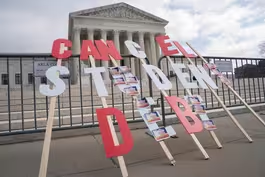
Food banks prepare for spike as pandemic SNAP benefits end
Clip: 2/28/2023 | 7m 11sVideo has Closed Captions
Food banks prepare for spike as pandemic SNAP benefits come to an end
In the last three years, households eligible for food assistance received at least $95 more per month as part of a pandemic-era increase to combat hunger. But Wednesday, those benefits will expire, meaning a smaller monthly food budget for nearly 30 million Americans. William Brangham visited a food bank in rural Virginia that’s gearing up to meet the increased need this cut will likely trigger.
Problems playing video? | Closed Captioning Feedback
Problems playing video? | Closed Captioning Feedback
Major corporate funding for the PBS News Hour is provided by BDO, BNSF, Consumer Cellular, American Cruise Lines, and Raymond James. Funding for the PBS NewsHour Weekend is provided by...

Food banks prepare for spike as pandemic SNAP benefits end
Clip: 2/28/2023 | 7m 11sVideo has Closed Captions
In the last three years, households eligible for food assistance received at least $95 more per month as part of a pandemic-era increase to combat hunger. But Wednesday, those benefits will expire, meaning a smaller monthly food budget for nearly 30 million Americans. William Brangham visited a food bank in rural Virginia that’s gearing up to meet the increased need this cut will likely trigger.
Problems playing video? | Closed Captioning Feedback
How to Watch PBS News Hour
PBS News Hour is available to stream on pbs.org and the free PBS App, available on iPhone, Apple TV, Android TV, Android smartphones, Amazon Fire TV, Amazon Fire Tablet, Roku, Samsung Smart TV, and Vizio.
Providing Support for PBS.org
Learn Moreabout PBS online sponsorshipAMNA NAWAZ: In the last three years, households eligible for food assistance received at least $95 more per month as part of a pandemic era increase that was designed to combat hunger.
But, tomorrow, those benefits will expire nationwide, meaning a smaller monthly food budget for nearly 30 million Americans.
William Brangham spent yesterday at a food bank in rural Virginia that's gearing up to meet the increased need this cut will likely trigger.
WILLIAM BRANGHAM: It's another busy week at the Fauquier Community Food Bank in Warrenton, Virginia.
About 25 families a day come here to stock up on free groceries.
WOMAN: You're all set here.
Tony is going to take you.
WILLIAM BRANGHAM: Thirty-old-year-old Tiffany Robinson visits the food bank to help stretch the money she receives through the Supplemental Nutrition Assistance Program, known as SNAP, the very benefits that will soon be cut back.
TIFFANY ROBINSON, SNAP Recipient: That's really going to affect my budget because I'm going to have to come out of pocket even more what than I do now to get groceries.
WILLIAM BRANGHAM: SNAP, which used to be called food stamps, is the Department of Agriculture program that provides monthly stipends for lower-income Americans to spend on groceries.
In March 2020, Congress passed temporary SNAP increases to help people weather the pandemic-economy, but last December passed another law ending those increases.
So, tomorrow, Americans in 32 states and other jurisdictions will see those extra SNAP benefits expire; 18 states have already rolled them back.
A 2022 Urban Institute study found these emergency allotments kept more than four million people above the poverty line in the last quarter of 2021, reducing poverty by nearly 10 percent.
The coming reduction in SNAP benefits will be different for different households, depending on their circumstances.
But, on average, a family of three will lose nearly $200 per month from their benefits.
The cuts will reduce payments to about $6 per person per day.
Robinson says that's not enough to feed her children, and she will need to depend on this food bank even more.
TIFFANY ROBINSON: You know, like, I am panicking a little bit.
Like, I really was when I got that message.
I was like, so, what am I going to do next month?
It really sent me into a stressful state, because I'm worried about my children.
My children eat more than I do.
I will probably have to come here more often or try to find other outlets, so I can get food for my children.
WILLIAM BRANGHAM: Food pantries like this are pressed on two sides, rising demand for their help, but rising costs constraining how much they can provide.
Staples like eggs are up over 70 percent compared to last year.
WOMAN: We have got tomato soup this month.
We have got applesauce, mac and cheese.
WILLIAM BRANGHAM: Most of these goods come via donations from local grocery stores or bought with local donations, or proceeds from their thrift store next door.
Sharon Ames is the executive director of the Fauquier Community Food Bank.
And we talked yesterday about her community and what these cuts might meet for them.
Who is it that you serve?
Who are the people that come through your door?
SHARON AMES, Executive Director, Fauquier Community Food Bank: It is all walks of life.
And I will go back to the thrift store side.
I have people now who used to shop over there who know their money went to buy food here, but now they have had to come to me and say: Times have changed.
Gas is high.
Food is high.
I need your help.
We help the homeless.
It's everybody.
WILLIAM BRANGHAM: We're here talking to you because the pandemic SNAP benefit extension is about to expire.
SHARON AMES: Yes.
WILLIAM BRANGHAM: Do you have a sense of what that's going to mean for the people of this county?
SHARON AMES: We are going to feel it.
They're going to feel it.
They are starting to call now and ask us questions about if we can expand and they can get more food if need be.
And we always answer, yes, we will do the very, very best we can.
From what I am hearing and what I'm understanding, it can be around $95 to 100-and-some dollars a month.
But, again, that depends on their family, how big their family is, how much they get, to what their cut will be.
WILLIAM BRANGHAM: And for people who may not appreciate the circumstances of the families that you help, $95 to $100 a month, how significant is that?
SHARON AMES: That's huge.
That's $25 a week.
That's huge.
That's milk.
That's bread.
That's peanut butter.
That's hamburger.
It's huge.
That's big to them.
WILLIAM BRANGHAM: Is it your sense that most of the families that are going to see a cut in their benefits are going to be OK?
SHARON AMES: They will be OK.
They will manage.
They will survive.
They will probably make an extra phone call to us and say, look, I have got three or four more days in a month to go.
I'm out of food.
Can you give me food?
And we will.
I believe in my community, and I believe, if we reach out and say we need help, that it will be there.
I think the other thing we have to look at is, down the road, think about summer, when the children are out of school, no free lunches, no free breakfast.
WILLIAM BRANGHAM: There are some people in Congress who argue that the SNAP program, the food stamp program, is too expensive, and this pandemic extension, bump-up was too much, and that we have to dial those costs down.
I mean, as someone who sees the beneficiaries of this program, what do you think of that argument?
SHARON AMES: We are going to see children who are not going to function in school because they are not fed properly, they go to bed hungry.
We are going to see elderly that give up their medicine, diabetic medicine, whatever it may be.
WILLIAM BRANGHAM: The choice between food and medicine is too great.
SHARON AMES: Absolutely.
We're going to - - it is.
It is going to affect everybody.
And I'm not really sure how Congress is coming up with the fact that it's too much money, when you're going to feed people and keep them healthy and make them part of our society.
WILLIAM BRANGHAM: You think that's not the right place to cut?
SHARON AMES: No.
And I know the argument is -- that's why when I say that we qualify people, a lot of people view a food pantry as you just go in and say: Hey, I want food.
It's not like that.
We do qualify you.
SNAP does too.
So, it is a program that is -- has rules.
WILLIAM BRANGHAM: You are meeting people with demonstrated needs.
SHARON AMES: You see somebody come to you, and you give them a can of tuna, and they hold it to them and say: "Oh, my God, Sharon, this is four meals."
No, it's not.
It's one.
That will make you stop and think.
And, at our level, we see that, we hear that.
Congress don't.
WILLIAM BRANGHAM: All right, Sharon Ames, thank you so much for talking with us.
SHARON AMES: Thank you very much.
Exhibit spotlights portraits, stories of Black Southerners
Video has Closed Captions
Clip: 2/28/2023 | 5m 9s | Exhibit spotlights portraits and stories of Black Southerners living during Jim Crow era (5m 9s)
Jan. 6 investigator says giving footage to Fox poses threat
Video has Closed Captions
Clip: 2/28/2023 | 8m 26s | Former Jan. 6 investigator says releasing footage to Fox could pose a new threat (8m 26s)
Supreme Court hears challenge to student loan relief plan
Video has Closed Captions
Clip: 2/28/2023 | 11m 12s | Breaking down the arguments as Supreme Court hears challenge to student loan relief plan (11m 12s)
Ukrainians in Bucha reflect on horrors and Russian brutality
Video has Closed Captions
Clip: 2/28/2023 | 9m 20s | Ukrainians in Bucha reflect on horrors and brutality suffered at hands of Russian forces (9m 20s)
Providing Support for PBS.org
Learn Moreabout PBS online sponsorship
- News and Public Affairs

FRONTLINE is investigative journalism that questions, explains and changes our world.

- News and Public Affairs

Amanpour and Company features conversations with leaders and decision makers.












Support for PBS provided by:
Major corporate funding for the PBS News Hour is provided by BDO, BNSF, Consumer Cellular, American Cruise Lines, and Raymond James. Funding for the PBS NewsHour Weekend is provided by...



